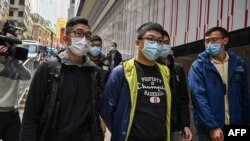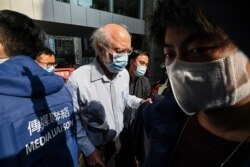At least 50 pro-democracy activists were arrested Wednesday in Hong Kong in the biggest crackdown on opposition forces in the semiautonomous city under the new national security law.
Hong Kong news outlets said those arrested in the early-morning sweep included several members of Hong Kong’s Democratic Party who took part in an unofficial primary election last July to pick candidates to run in legislative elections initially scheduled for September. The balloting was postponed because of the COVID-19 pandemic.
The party said on its Facebook page that former lawmakers and activists Benny Tai, James To, Lester Shum and Lam Cheuk-ting were among those detained.
News outlets also said John Clancey, an American lawyer who works for the prominent Hong Kong law firm Ho, Tse, Wai and Partners that takes on human rights cases, was arrested when police raided the firm’s offices.
The Democratic Party candidates had hoped to win a majority of seats in the Legislative Council that would allow them to vote down proposed budgets and any legislation considered to be pro-Beijing.
"If even holding primaries can be falsely accused, can be forced, can be made out of nothing, saying that it will endanger national security, the security of this country is really very fragile,” said party Chairman Lo Kin Hei at a news conference.
“You hold primaries and elections, and they say you violate the National Security Law. The National Security Law becomes the 'universal key.’ Then what everyone sees will be white terror, and this is exactly what the Hong Kong government wants to create."
Other targets of Wednesday’s raids included the headquarters of Stand News, a prominent pro-democracy online news site. Video of the raid livestreamed by a Stand News reporter showed police issuing a court order for the editors to hand over documents related to a national security investigation.
A message posted on the Twitter account of jailed student pro-democracy activist Joshua Wong said police also raided his home Wednesday morning. Wong is serving a 13½-month prison sentence for organizing an unauthorized protest in 2019.
International human rights groups condemned the raids. Maya Wang, the senior China researcher at Human Rights Watch, issued a statement saying authorities had removed “the remaining veneer of democracy” in Hong Kong, but warned that “millions of Hong Kong people will persist in their struggle for their right to vote and run for office in a democratically elected government.”
Antony Blinken, U.S. President-elect Joe Biden’s choice for secretary of state, issued a statement on Twitter calling the raids “an assault on those bravely advocating for universal rights,” and pledged that the incoming administration “will stand with the people of Hong Kong and against Beijing’s crackdown on democracy.”
U.S. Senator Ben Sasse, a member of the Senate Intelligence Committee, said the raids were a ploy by Chinese President Xi Jinping to take advantage of “a divided and distracted America.”
“These despicable raids expose the Chinese Communist Party for the cowardly dictators they are,” Sasse said in his statement.
Hong Kong authorities have increasingly clamped down on the city’s pro-democracy forces since Beijing imposed the new national security law last July. Several pro-democracy lawmakers resigned en masse late last year after four of their colleagues were disqualified by the government, while several prominent activists have been arrested and jailed, including Wong and media tycoon Jimmy Lai, 73, who was arrested last month on an initial charge of fraud and has since been charged under the new law with “foreign collusion.”
Under the law, anyone in Hong Kong believed to be carrying out terrorism, separatism, subversion of state power or collusion with foreign forces could be tried and face life in prison if convicted.
Beijing imposed the new law in response to the massive and often violent pro-democracy demonstrations that engulfed the financial hub in the last half of last year. The law is the cornerstone of China's increasing grip on the city, which was granted an unusual amount of freedoms when Britain handed over control in 1997.
Richard Green contributed to this report.

